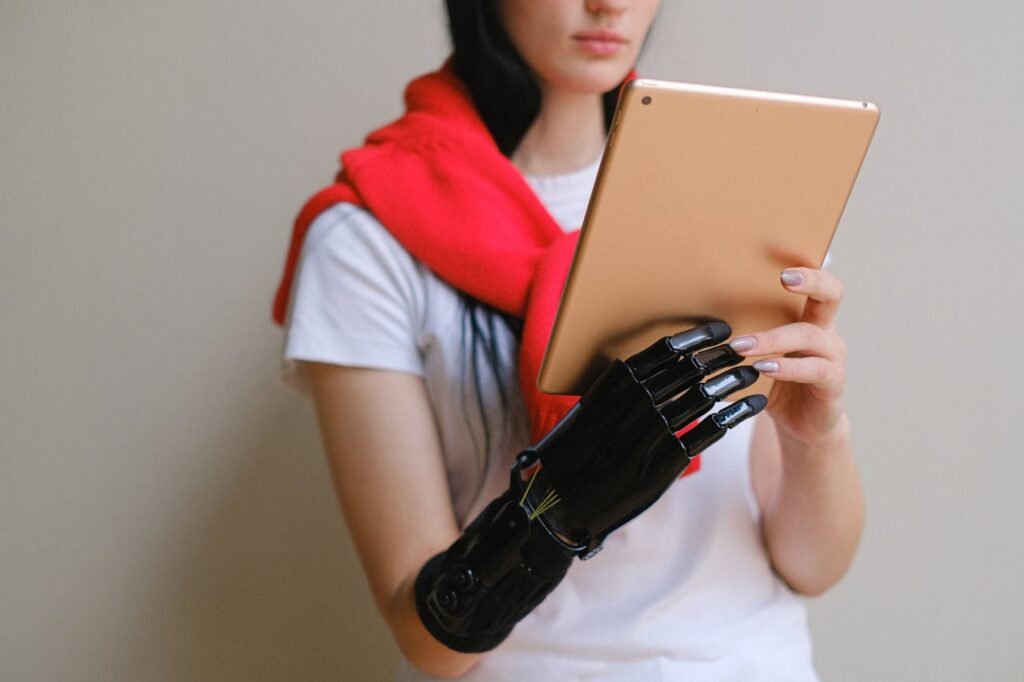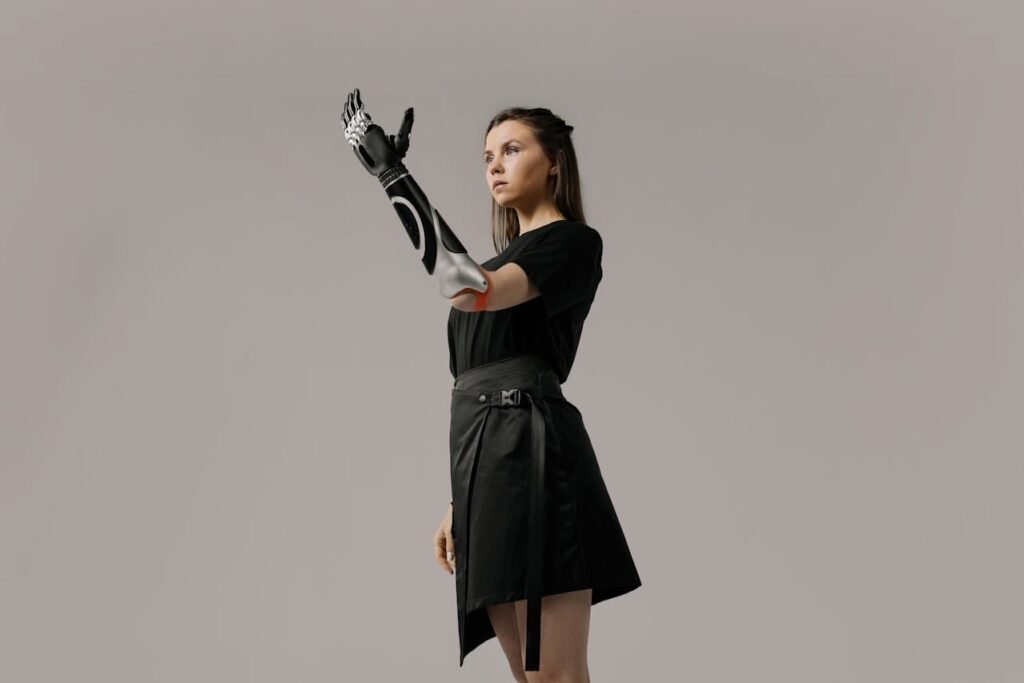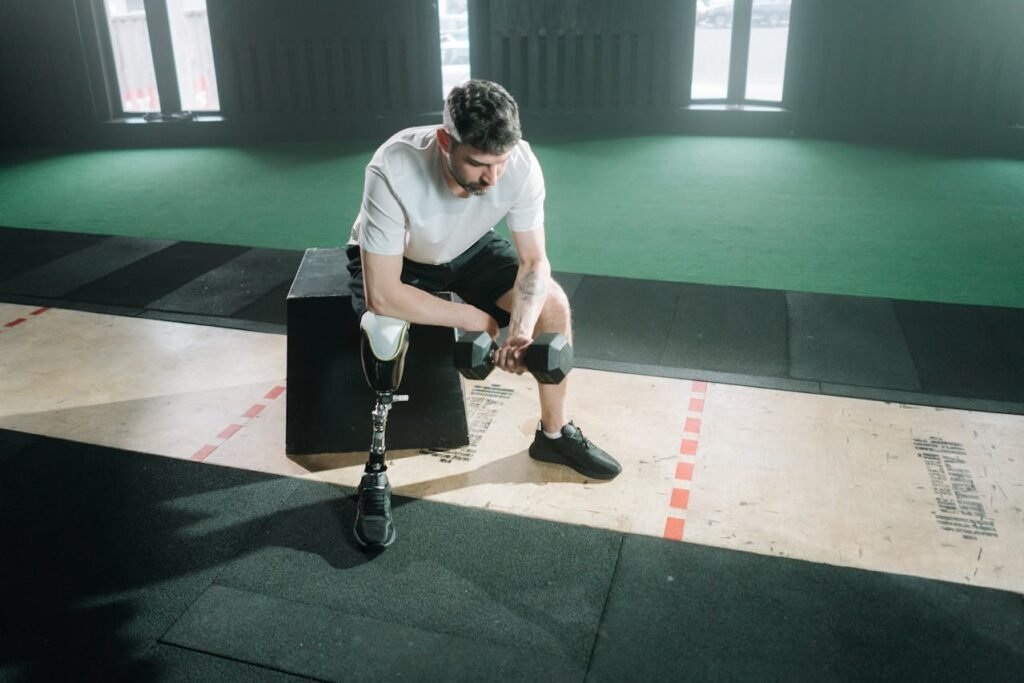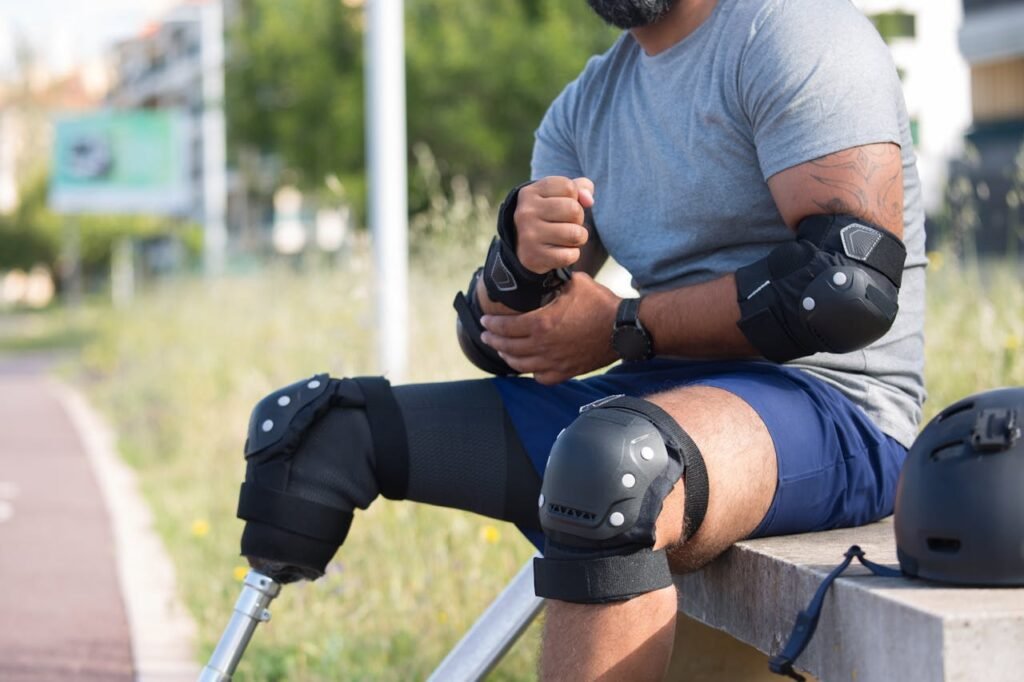Rainy days can be peaceful. The sound of raindrops, the cool breeze, the smell of wet earth. But for someone using a prosthetic hand or limb, the monsoon can be tricky.
Water, humidity, and dampness are not good friends of prosthetic devices. Especially in cities like Mumbai, Chennai, and Kochi, where the rain pours heavily, and the air stays wet for months.
At RoboBionics, we’ve met hundreds of people who worry about their prosthetics during the monsoon. Will it get damaged? What if it rusts? How do I dry it? What if I slip?
This guide is for you.
Whether you’re using our Grippy™ Bionic Hand or any other prosthetic, we’ll walk you through simple, practical tips to keep your device safe, clean, and working well — even when it’s pouring outside.
Let’s start by understanding why the monsoon is such a challenge for prosthetic care — and how you can stay one step ahead.
Why the Monsoon is Tough on Prosthetics
Humidity is the Hidden Enemy

In cities like Mumbai, Chennai, and Kochi, the air stays damp for weeks. Even when it’s not raining, everything feels moist.
Humidity doesn’t just make clothes sticky or walls damp. It seeps into prosthetic parts too.
Over time, it can affect wiring, reduce battery life, and even cause mold to grow in soft inner linings.
Water Can Sneak In Anywhere
Even if your prosthetic seems sealed, water always finds a way. A short walk in the rain, a puddle you didn’t see, or just damp socks can do damage.
Some devices are water-resistant. Very few are fully waterproof.
It’s important to know which one yours is. At RoboBionics, we design devices like Grippy™ with protection in mind, but extra care is still needed in monsoons.
Slippery Roads Mean Risky Moves
Another big danger? Slips and falls.
Many prosthetic users feel unsure walking on wet roads or muddy paths. The fear of slipping is real — and so are the chances of getting hurt.
Knowing how to walk safely and adjust your grip or gait during rains makes a big difference.
Daily Care Routine During Monsoon
Wipe Down Every Time You Step In
Whenever you come in from outside, make it a habit to gently wipe your prosthetic with a dry, soft cloth.
Focus on the joints, fingers, and battery area if it’s an electronic device like Grippy™.
This stops moisture from staying on too long and keeps your device dry.
Keep a Spare Cloth in Your Bag
Always carry a small microfiber cloth with you during the monsoon.
If you get caught in the rain, quickly pat your prosthetic dry. It might seem like a small thing, but it helps more than you think.
Also, try to keep the cloth in a ziplock so it stays dry too.
Air it Out – But Carefully
Every evening, take off your prosthetic and let it breathe.
Don’t keep it inside closed drawers or under piles of clothes. Place it on a clean, dry surface in a well-ventilated room.
Use a fan or keep a window open. Avoid placing it near direct heat like gas stoves or old-school heaters — this can damage the parts.
Extra Tips for Myoelectric Devices Like Grippy™
Keep Battery Contacts Dry
Grippy™ uses battery-powered technology to function smoothly. But water and batteries don’t mix well.
If you notice any moisture around the battery area, take out the battery, wipe it gently, and let the compartment dry completely before reinserting.
Never force it in if it feels wet or sticky.
Use the Right Socket Covers
We always recommend waterproof or water-resistant socket covers during monsoons.
These covers act like raincoats for the part where your limb meets the prosthetic. They block out moisture and stop fungal infections from starting.
Ask your prosthetist or connect with RoboBionics for suggestions that fit your device best.
Don’t Charge in Damp Rooms
Charging your bionic hand in a wet room, like near the kitchen sink or bathroom, is risky.
Always use a dry spot — preferably one that’s far from windows or places where rain can splash in.
Also, don’t use extension boards that look old or rusty.
City-Specific Tips: Living With a Prosthetic in Mumbai
Mumbai’s Sudden Showers

In Mumbai, the rain often comes without warning. You might leave home under a clear sky and be drenched in ten minutes.
Always carry a small umbrella and a rainproof bag for your prosthetic care items.
If you’re using Grippy™, consider wrapping the hand in a plastic or waterproof pouch when you expect heavy rain — even if it’s just for a few minutes.
Local Trains and Crowds
Navigating Mumbai’s trains during the monsoon can be tough.
Crowds, wet platforms, and constant pushing can put pressure on your prosthetic arm or leg.
Hold onto railings with your sound hand. If your prosthetic is grippy enough and dry, you can use it too — but only when you feel confident.
Also, avoid leaning your device against wet surfaces inside trains.
Coastal Moisture is a Constant
Because Mumbai sits next to the sea, the air is always salty and humid.
This salt in the air can increase rust on metal parts. Clean and check your device often for early signs of corrosion.
If you’re unsure what to look for, you can reach out to our care team. We’re happy to help.
City-Specific Tips: Living With a Prosthetic in Chennai
The Heat and Humidity Combo
Chennai doesn’t just get rain. It gets rain with heat. That means sweat, sticky skin, and prosthetic sockets that feel like they won’t stay in place.
This mix of heat and moisture can cause skin irritation, rashes, and even fungal infections around the stump area.
To prevent this, wash the stump area gently every night. Dry it well. Use a light powder or medicated cream if your doctor recommends it.
Also, clean the socket liner with a damp cloth and dry it completely before putting it on again.
Stay Cool to Stay Comfortable
The heat can also make wearing a prosthetic uncomfortable for long hours.
Try using soft cotton stump socks that absorb sweat better. Change them often during the day if they get damp.
If your prosthetic feels too hot or sticky during travel, take a break. Remove it when possible and give your skin a breather.
Be Prepared for Power Cuts
Chennai often faces short power cuts, especially during storms.
If you use a battery-operated prosthetic like Grippy™, charge it during the day when power is more stable. Don’t wait till night.
Keep a power bank ready if your device uses USB charging. That way, you’re not left helpless if there’s a long outage.
City-Specific Tips: Living With a Prosthetic in Kochi
Rain That Lasts for Days
Kochi gets long stretches of continuous rain. It can rain for days without stopping.
This makes everything around feel damp — the floor, the bed, your clothes, even the air you breathe.
If you’re using a prosthetic, keep two sets of stump liners or sleeves. Use one while the other dries.
Don’t wait for it to dry fully on your body — this can lead to serious skin issues.
You can also use silica gel packs in your storage area to reduce moisture.
Wet Roads and Slippery Tiles
Kochi has a lot of tiled paths and roads. These become very slippery when wet.
Walk carefully, especially in areas near markets or hospitals. Always wear good-grip footwear.
If you’re using a lower-limb prosthetic, ask your prosthetist to check if your foot has anti-slip soles.
In case of falls, even small ones, inspect your prosthetic at once. A small crack can turn into a big break if ignored.
Mold Can Grow Fast
Because of constant dampness, mold can grow quickly on soft parts of a prosthetic, especially inside liners and padding.
Check for any strange smell, dark spots, or slippery feel.
Wash with mild soap and water, dry fully, and store in a clean area. You can also use anti-fungal sprays if needed — just make sure they’re safe for your device.
Smart Storage Tips for Rainy Days
Choose the Right Spot

Avoid storing your prosthetic near windows, bathrooms, or kitchen corners.
Instead, pick a cool, dry cupboard or a raised shelf. Use a cloth cover or a bag that allows air to pass through.
Never store it in a plastic bag for long — it traps moisture.
Add Moisture Absorbers
Simple items like silica gel, charcoal bags, or dehumidifier boxes can help a lot.
Place them in your prosthetic storage box or cupboard. They silently absorb moisture and reduce the risk of rust or fungus.
Change them every few weeks to keep them working well.
Let the Device Rest
Your prosthetic works hard for you all day. At night, let it rest too.
Take it off, clean it gently, and store it in a position that doesn’t stress the joints or connectors.
If you’re unsure about the best position, check the user manual or ask our team. We’re always here to guide you.
Traveling During Monsoon with a Prosthetic
Pack Smart, Pack Dry
If you’re going out of town, keep a waterproof bag just for your prosthetic care items.
Pack a cloth, spare socks or liners, battery charger, and a backup sleeve if possible.
Don’t forget your medical ID or care notes in case you need support during travel.
Use Public Transport Wisely
Whether it’s buses in Chennai, autos in Kochi, or taxis in Mumbai, make sure your seat is dry before you sit.
Avoid placing your prosthetic on the wet floor. If your hand or leg gets damp, clean it as soon as possible.
Stay alert in crowded places to avoid bumping or pressure on your device.
Check Before You Sleep
When you reach your hotel or relative’s home, do a quick check of your prosthetic.
Make sure everything’s dry and clean. Even if you didn’t face rain, it’s good to stay in the habit.
This five-minute check can save you from bigger issues later.
Skin Care Matters More in Monsoon
Watch Out for Damp Skin

When your skin stays wet for too long, it gets weak. That’s when cuts, rashes, and sores can happen.
This is common in the stump area where the prosthetic meets your body. Sweat, rain, or water from cleaning can stay trapped and cause problems.
To avoid this, always dry your skin well before putting on your prosthetic. Even a few drops of moisture can lead to irritation.
Gentle Cleaning, Every Day
Use lukewarm water and a mild soap to wash the stump area every evening.
Don’t scrub hard. Pat dry gently with a soft towel.
You can also use antiseptic wipes if you’re outdoors and can’t wash right away.
If you see redness or feel itching, don’t ignore it. See a doctor or talk to your prosthetist.
Let the Skin Breathe
Whenever possible, give your skin time without the prosthetic — even if it’s just for 30 minutes a day.
This helps it stay fresh and strong. If you’re indoors and don’t need the device, take it off and let the skin rest.
Also, avoid tight bandages or layers of clothing around the stump in this weather.
Monsoon Blues: Taking Care of Your Mind
The Weather Affects Mood Too
It’s not just your prosthetic that feels the monsoon — your mind does too.
Long rainy days, grey skies, and staying indoors can make anyone feel low. If you’ve had an amputation, these feelings can hit harder.
You may feel tired, frustrated, or even lonely.
That’s okay. You’re not alone in this.
Stay Connected
Talk to someone every day. A friend, a family member, or someone from your support group.
Even a short chat can lift your mood.
Join online communities of prosthetic users. Sharing your story or hearing someone else’s can bring real comfort.
At RoboBionics, many of our users stay in touch with us not just for help — but for hope. You can too.
Do Things You Love
Even on rainy days, find small joys. Read. Watch something light. Listen to your favorite music.
If you like writing, keep a journal. If you like drawing, let your creativity flow.
Your mental health is just as important as physical care during the monsoon.
Routine Checkups During Monsoon
Book a Monsoon Season Check

This is the best time to visit your prosthetist and get your device checked.
They’ll look for early signs of damage — like rust, loose screws, or small cracks that you might miss.
They’ll also check if your socket is still fitting well, especially since humidity can change how your stump feels.
If you’re using a Grippy™ Bionic Hand, you can also schedule a free care review with our team.
Keep a Care Journal
This sounds simple, but it helps a lot.
Just jot down any unusual feeling, sound, or movement in your prosthetic.
Was it slower today? Did it make a noise? Did something feel loose?
Bring this note to your next checkup. It’ll help the expert understand your device better.
Don’t Wait for a Problem
Sometimes we wait for a device to stop working before asking for help.
But in the monsoon, small problems grow fast.
If something doesn’t feel right — even a tiny issue — reach out. Call your provider. Email your prosthetist. Message our team.
We’d rather help you early than see your device get damaged.
How RoboBionics Supports You in the Rainy Season
Monsoon-Ready Designs
Our Grippy™ Bionic Hand is built with the Indian climate in mind.
We use rust-resistant materials, water-aware design, and sealed components to protect against moisture.
But even the best design needs care. That’s why we guide every user on how to manage their device during the rains.
Friendly Help is Just a Call Away
Whether you live in Mumbai, Chennai, Kochi, or a remote town, our care team is here for you.
We offer phone, video, and in-person support.
If you need help with cleaning, storage, or travel tips — just ask.
You can even schedule a personalized demo or care session through our website at https://www.robobionics.in/bookdemo
We Listen, We Learn, We Improve
Many of the tips in this guide come from real users like you.
We listen to your experiences, your struggles, and your victories — and we use them to improve our products and support.
Your voice shapes what we do at RoboBionics.
You Are Stronger Than the Rain
Every Drop is a Reminder of What You’ve Overcome

The monsoon can feel like a challenge. Wet shoes. Crowded buses. Slippery streets. And the constant worry of keeping your prosthetic safe.
But if you take a step back — you’ll see something amazing.
You’ve already come so far.
Learning to live with a prosthetic takes courage. Walking again, writing again, riding again — that’s not easy. That takes strength.
And if you’ve done all that, a little rain? You can handle that too.
Care is Power
Taking care of your prosthetic isn’t just about keeping it clean.
It’s about giving yourself the freedom to live fully — rain or shine.
It’s about making sure nothing holds you back from going to work, meeting friends, or simply stepping outside without fear.
These little habits — wiping down, storing well, checking parts — they give you more than a working device. They give you confidence.
Confidence that your bionic hand or leg will be ready when you need it. That it will work the way it should. That you are in control.
You’re Not Alone in This
And remember — you’re never alone.
Whether you live in a tiny fishing village near Kochi or a fast-paced suburb of Mumbai, we are with you.
RoboBionics is not just a company that builds prosthetics. We’re a team that listens, learns, and walks beside you.
If you ever feel unsure, or need help, or just want someone to understand what you’re going through — reach out.
Our engineers, prosthetists, care experts — even our founder — we’re all just one call or message away.
Because your journey matters to us.
Let the Monsoon Be a Season of Strength
Instead of seeing the rain as a problem, what if we saw it as a teacher?
It teaches us to prepare. To slow down. To care for what we have.
It teaches us that even in gloomy weather, there’s beauty.
And it reminds us that strength doesn’t come from sunshine. It comes from showing up every single day, no matter the storm.
So this monsoon, walk forward with care. Walk forward with pride. Walk forward knowing that your prosthetic is not just a tool — it’s a part of your story.
And like you, it’s ready for anything.
Need help getting your prosthetic monsoon-ready? We’re here.
Book a free care session or demo at https://www.robobionics.in/bookdemo
Or call us directly. We’d love to hear from you.
Stay dry, stay safe, and stay strong.
From all of us at RoboBionics — we believe in you.



